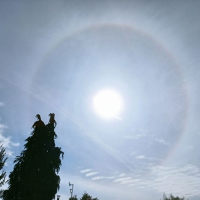G8JNJ
About
- Username
- G8JNJ
- Joined
- Visits
- 4,627
- Last Active
- Roles
- Member
- Points
- 127
Reactions
-
Trying to understand this noise
Don't buy the Bonito loop.
Have a look at the Loop Antennas IO group.
https://groups.io/g/loopantennas
You will find some familiar names on there, and one or two, are offering ready built loop amplifier PCB's based on Wellbrook and LZ1AQ's designs.
My personal favourites are versions of the LZ1AQ loop amplifier. But for a bit more money, you could buy a much more versatile ready built LZ1AQ active antenna amplifier, that facilitates both switched active loop and dipole modes. This is highly effective and still costs a fraction of the Bonito (which is based around a cheap video amplifier chip).
Chavdar's other webpages are a goldmine of information and highly recommended too.
https://www.lz1aq.signacor.com/docs/lz1aq-topical-article-index.php
I hope this provides some alternative options.
Martin
-
Register Kiwi SDR online
"Many thanks, there seems to be so much to look at with so many tabs on the admin page."
There are so many user cases that it's difficult to cater for everyone. But the more you use your KiWi, the more thankful you will become that a specific feature has been included in the admin setup.
I run several different types of web sdr, and the KiWi is the one that has incorporated the most useful features and suggestions from users and admins alike.
Many other developers will simply ignore such requests, because they personally don't understand the requirement, or simply focus on the software, rather than the needs of the users.
Some other web sdr's, require you to be a Linux guru before you can get up and running, so the KiWi is pretty much "plug and play" in comparison.
Regards,
Martin
-
How clean is my KiwiSDR setup
Hi Frank,
That looks clean, and the distribution of noise looks to be correct.
The fun starts when you connect your antenna, mainly because of introducing other conducted paths for noise to ingress.
As a further test, connect just the ground from your antenna connection cable to the ground of the KiWi, and see what changes.
Then try and fix / resolve any additional noise you can see, before fully utilising the antenna.
Common mode chokes, galvanic isolation, and additional filtering of the power supply, network and GPS cable may all help.
Regards,
Martin
-
Interference & a Galvanic isolator
I'd be tempted to have a chat with your neighbour, mine have always been interested in finding out what could be causing such interference, but perhaps I'm lucky that many of them seem to be ex-engineers.
As previously mentioned, it's most likely a Chinese battery charger or similar, that hasn't got the mains filter components fitted.
Also, don't discount your own property, try and drop the main breaker if you can, whilst monitoring using batteries. It's surprising what can be overlooked.
Regards,
Martin
-
Maximum possible number of simultaneous users
In addition.
If you have more than the specified number of users trying to connect, the additional ones can "queue" to wait for the next free slot, or "camp" where they can "piggyback" onto an existing user and hear just the audio.
This is useful when you have a lot of users all wanting to listen to the same thing, such as a popular amateur radio net.
The maximum number of campers can be defined in the "Control" admin page.
Regards,
Martin







